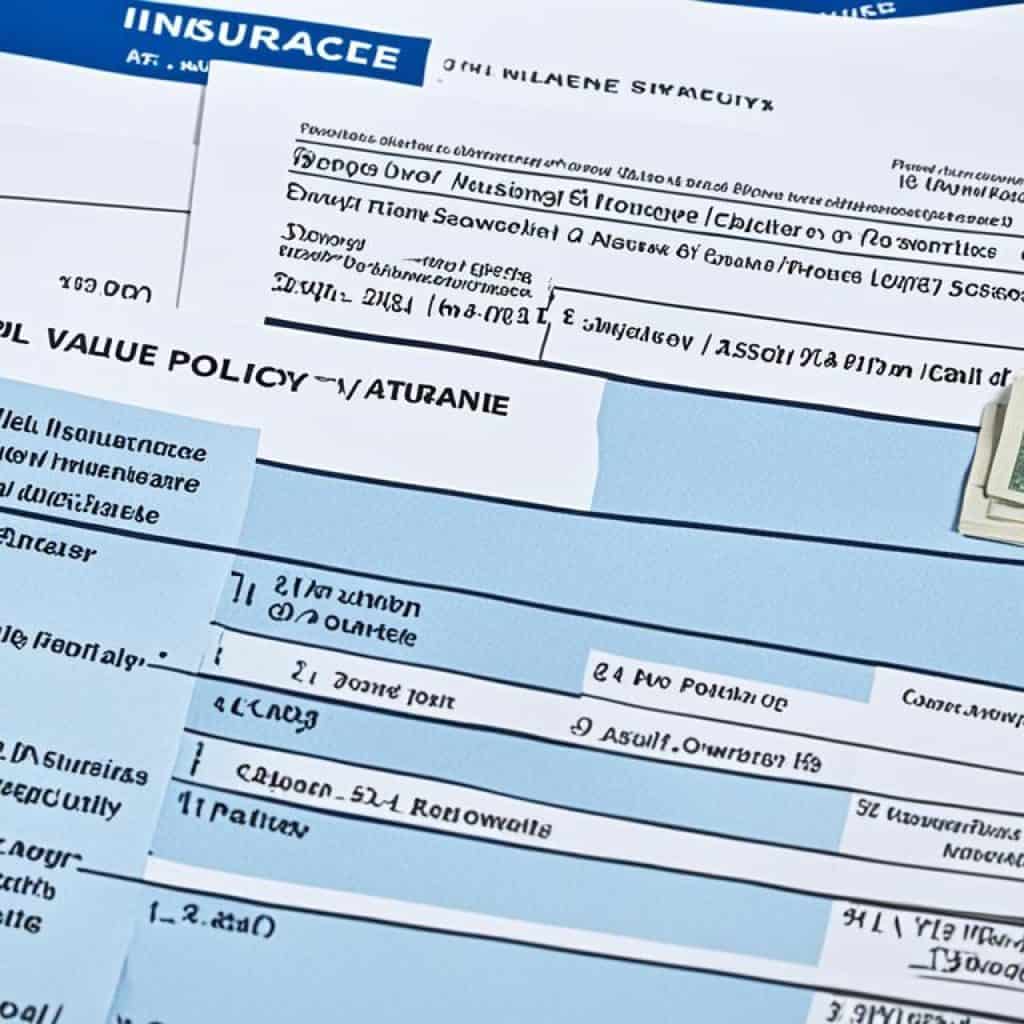Going through a divorce is tough, both in your heart and wallet. It’s key to check and tweak your life insurance to fit your new life. Life insurance is a big part of keeping you and your family safe financially. Making the right changes can help you feel more secure during this hard time.
Many couples name their spouse as the main person to get their life insurance money1. But, this might not work after you’re divorced. You can change who gets your life insurance money anytime1. This is good news as you update your policies to keep your loved ones safe.
Whole and universal life policies grow in value over time and add to your couple’s wealth1. When you get divorced, things like the cash value in life insurance might be split between you and your ex1. It’s important to know how these policies work as you figure out your finances after the divorce.
Key Takeaways
- Life insurance policies are usually easy to change, letting you pick a new person to get the money after a divorce
- The cash value in life insurance can be seen as something you both own, and it might be split in a divorce
- It’s important to update who gets your life insurance money and how much you have to keep your loved ones safe after a divorce
- Talking to a financial advisor and your divorce lawyer can help make sure your life insurance needs are covered during this change
- Keeping your life insurance can help you and your kids stay financially secure if you’re the main caregiver
Understanding Life Insurance After Divorce
Life insurance matters can get tricky during and after a divorce. You might wonder, what happens to your life insurance policy when you get divorced? Who pays the premiums, and who gets the benefits?2 The answers depend on your situation and your divorce agreement.
Common Questions and Concerns
People often ask about life insurance and divorce. Here are some common questions:
- Can I keep my life insurance policy after my divorce?
- How does my divorce affect the beneficiary of my life insurance policy?
- Who will pay the premiums on my life insurance policy after the divorce?
- Do I have the right amount or type of life insurance coverage post-divorce?
Your answers will depend on your divorce agreement and life insurance policy details2. A financial expert can help make sure you have the right coverage and address your concerns.
Importance of Reviewing Your Policy
It’s key to review your life insurance policy during and after a divorce2. You need to make sure it fits your current needs. This means updating beneficiaries or coverage amounts if needed3. Not reviewing and updating your policy can lead to problems, like disputes over who gets the benefits or not having enough protection.
Understanding how divorce affects your life insurance and taking steps to review and update your policy is crucial4. This way, you and your loved ones stay financially secure during this big change.
Getting advice from experts like financial advisors or family law attorneys is very helpful3. They can guide you in making smart choices about life insurance after divorce234.
Court-Ordered Life Insurance in Divorce
In a divorce, life insurance is key to keeping your finances safe, especially if you have kids. The court might tell you or your ex to keep a life insurance policy, with your kids as the ones who get the money5. This makes sure money for alimony or child support keeps coming if the person paying dies6.
Life insurance policies with cash value are seen as marital stuff that gets split in a divorce56. But term life insurance doesn’t have cash value, so it doesn’t get split5. No matter the type, the court might tell you or your ex to get life insurance to make sure money for alimony or child support is paid6.
Legal Requirements for Coverage
There are important legal things to remember about court-ordered life insurance in a divorce. The court might say exactly what the policy should cover, who owns it, and who pays for it5. You’ll need to show proof of the life insurance policy to follow the law and prove you’re doing what you’re supposed to5.
Getting court-ordered life insurance can take a while, sometimes up to six weeks or more5. Start this process early in your divorce to make sure the policy is ready when it’s needed5. Not following the court’s life insurance rules can lead to legal trouble, so it’s important to know and do what you need to5.
Dealing with court-ordered life insurance can be tough, but it’s key to protecting your family’s money after a divorce56. By knowing the legal stuff and acting fast, you can make sure your family is safe, even if something unexpected happens567.
Ownership and Premium Payments Post-Divorce
After a divorce, who owns the life insurance and who pays the premiums is key. The divorce decree will say who owns the policy, who it covers, and who pays for it8.
Who gets the life insurance depends on what you agree to in the divorce. If one ex-spouse doesn’t pay the premiums, it’s a big problem. The courts can make them pay8.
| Policy Type | Marital Asset Consideration | Insurable Interest Post-Divorce |
|---|---|---|
| Whole/Universal Life | Considered a marital asset due to cash value | Typically, ex-spouses cannot be maintained as beneficiaries |
| Term Life | Not considered a marital asset as it lacks cash value | Typically, ex-spouses cannot be maintained as beneficiaries |
In many places, ex-spouses can’t have an insurable interest in each other after divorce9. This means they can’t keep life insurance on their exes, even if the divorce says they should8.
If custody or alimony is part of the divorce, the ex-spouse might have to pay premiums8. Not paying could cancel the policy, which is bad news for the kids10.
Handling life insurance after a divorce needs careful reading of the divorce decree and talking to the insurance company8109.
Handling Cash Value Life Insurance in Divorce
When getting a divorce, people often focus on dividing things like property and bank accounts. But, they often forget about the cash value in life insurance policies. This part can be a big joint asset that needs to be split11.
Whole life or universal life insurance builds up a cash value over time. This cash value is seen as a marital asset and must be split between you and your ex11. How it gets split depends on your state’s laws and your divorce agreement details.
Dividing the Cash Value Component
There are a few ways to split the cash value of a life insurance policy in a divorce:
- The policy might be ended, and the cash value is split even between spouses11.
- One spouse might keep the policy, and the other gets a cash value part in the divorce settlement11.
- Spouses might keep the policy, each owning part of it and sharing future cash value11.
Ending a life insurance policy can lead to surrender charges, lowering the cash value to divide11. Some courts might also make the paying spouse keep a life insurance policy, with the other as the beneficiary11.
| Scenario | Approach | Considerations |
|---|---|---|
| Policy Termination | Cash value split evenly | Surrender charges may reduce available cash value |
| One Spouse Retains Ownership | Other spouse awarded portion of cash value | Ongoing premium payments may be required |
| Policy Ownership Split | Spouses share policy and future cash value | Coordination and communication required |
Dividing cash value life insurance can be tricky, but it’s key in any divorce settlement. Knowing the options and what they mean helps you and your ex and lawyers find the right solution for you11.

“The cash value of a permanent life insurance policy could be considered a joint asset and divided between you and your ex-spouse as part of the divorce settlement.”
Updating Beneficiary Designations
After a divorce, it’s key to check and update your life insurance policy’s beneficiary list. Most life insurance policies let you change who gets the money at any time. But, some policies have irrevocable beneficiaries, meaning you can’t change them or cancel the policy without their okay12.
Not updating your life insurance after a divorce can lead to big problems. Many people don’t change their life insurance after a divorce, leaving their ex-spouse as a beneficiary12. This can cause fights and stress for your family when you pass away.
Changing Revocable vs. Irrevocable Beneficiaries
If your life insurance has a revocable beneficiary, you can change it anytime without asking the old one. This lets you make sure your money goes where you want it to13.
But, if your policy has an irrevocable beneficiary, you need their okay to change it. This might happen if your ex is the beneficiary and your divorce agreement didn’t change that13. You should talk to a lawyer or financial advisor to see what you can do.
| Revocable Beneficiary | Irrevocable Beneficiary |
|---|---|
| Can be changed without consent of existing beneficiary | Requires consent of existing beneficiary to make changes |
| Allows you to update beneficiary to reflect current wishes | Complicates the process of updating beneficiary after divorce |
| Ensures assets are distributed according to your preferences | May necessitate involvement of ex-spouse or legal professional |
Changing your life insurance after a divorce is important to make sure your money goes where you want. Knowing the difference between revocable and irrevocable beneficiaries helps you protect your family and avoid problems1213.
“The laws about life insurance after divorce can be tricky and differ by state. It’s key to look at your policy and get advice from a lawyer or financial expert to make sure your wishes are clear and your family is safe.”
Remember, who you choose as your life insurance beneficiary is a big part of your financial plan, especially after a divorce. Taking the time to update these choices can help your loved ones and give them peace of mind121314.
Protecting Your Children’s Financial Security
Going through a divorce? Life insurance can be key in securing your kids’ financial future15. Think about naming your kids or a trust as your policy’s beneficiaries. This way, they’re taken care of if something happens to you16. It’s crucial if your ex isn’t helping with support anymore17.
Ensuring Adequate Coverage for Minors
The court might ask the responsible person to keep a life insurance policy to cover support duties15. This protects your kids’ finances if the payer dies17. Since support orders can change, check and update your policy often15.
Divorce agreements might ask for life insurance updates or statements15. If someone doesn’t keep up with the policy, the court can make them get more coverage or use other assets for it15.
| Scenario | Possible Impact | Recommended Action |
|---|---|---|
| Your ex-spouse is no longer contributing to your children’s care through alimony or child support | Your children’s financial future may be at risk | Name your children or a trust as the beneficiaries of your life insurance policy |
| The court requires the responsible party to maintain a life insurance policy to match outstanding support obligations | This helps safeguard your children’s financial security in the event of the payer’s death | Review the policy regularly and make necessary updates as circumstances change |
| The obligated party fails to maintain the required life insurance policy | The court can order them to secure additional coverage or designate other assets for coverage | Ensure the obligated party fulfills the life insurance requirement as per the divorce agreement |
Keeping your kids’ financial future safe is key during a divorce. With the right life insurance and regular checks, you can secure their well-being151617.
“Life insurance can be a powerful tool to safeguard your children’s financial future, especially during a divorce.” – John Doe, Certified Financial Planner
Remember, your life insurance and divorce details can change based on your situation and laws. Always talk to a financial advisor or lawyer to make the best choices for your family16.
life insurance policy after divorce
After a divorce, it’s key to check and update your life insurance to match your new life. Some life insurance policies, like whole or universal life, might be seen as marital assets during divorce8. Often, ex-spouses must keep life insurance after divorce, especially if there’s alimony or child support8.
Changes in life insurance policies or who gets the benefits can happen after divorce8. You might need to adjust your life insurance to fit your new financial situation, like if support payments change8. There are different types of life insurance, like term, whole, universal, and final expense, to consider when reviewing your needs after a divorce8.
Most married people list their spouse as the main beneficiary1. After a divorce, especially if it was tough, you might not want your ex to benefit from your life insurance1. Most life insurance policies can be changed to update the beneficiary at any time; some can’t be changed once set1.
It’s smart to keep a life insurance policy on an ex if you get primary custody and need to cover child support or alimony1. If you’re now a single parent, getting enough life insurance for your kids or dependents is key1. For single parents, think about buying a policy that covers your income until your kids are grown, and add an inflation rider to keep up with costs1.
It’s vital to review and update your life insurance after a divorce, especially your beneficiaries and coverage amounts1. If you get primary custody and receive support, you might want to keep a policy on your ex to ensure that support is still paid if they pass away1.
Every year, over 700,000 divorces and annulments happen in the U.S17.. Life insurance is often part of divorce settlements to cover alimony and child support if the policyholder dies17. When figuring out how much life insurance you need for a divorce settlement, think about alimony and child support until the kids are eighteen17.
Who owns a life insurance policy should be decided during divorce, to manage changes and updates17. In divorce settlements, make sure to outline who pays premiums to keep the insurance active17. Always get legal advice before changing life insurance beneficiaries during a divorce to avoid issues like your ex still being listed17. It’s a good idea to check your life insurance beneficiaries before, during, and after divorce to make sure they match your current situation17.
Life insurance policies can help cover financial duties in divorce agreements if one party dies17.
“Updating your life insurance policy after a divorce is an important step to ensure your coverage still meets your needs.”
Considering Alimony and Child Support
If your ex-spouse pays alimony or child support, you might ask them to keep a life insurance policy18. This ensures those payments keep going if they die suddenly18. Keeping your ex-spouse with a life insurance policy helps you and your kids financially, especially if they’re still young18.
Securing Ongoing Payments
The policy’s value should match the support amount, including child and spousal support18. Choosing the right life insurance type is key, based on the support order and future finances18.
In spousal support cases, the supported spouse should get the policy’s benefits18. For child support, kids can be the policy’s beneficiaries18. Deciding who pays the policy premiums is important18.
It’s important to keep an eye on the policy to make sure it meets court orders18. Set clear rules on when the policy ends to avoid confusion18.
Choosing a trustworthy insurance company is key for reliable support of alimony and child support18.
Working with a certified financial planner after divorce helps with budgeting and meeting estate planning needs4. Term life insurance is best for those getting alimony or child support4. The policy should last until support ends4.
Life insurance is vital for protecting parents and kids after divorce, especially if one parent is the main earner or caregiver4. Update life insurance and beneficiaries after divorce to match new family situations and avoid confusion4.
Life insurance can secure child support if the paying parent dies19. Many divorcing parents wonder what happens if the paying parent dies before paying off child support19. Some couples use life insurance to ensure support is paid, either with current policies or new ones19.
Using a custodian under the Uniform Transfers to Minors Act (UTMA) can be a good option for managing insurance money for the child19. Many couples choose to name the surviving ex-spouse or parent as the policy’s beneficiary to support the kids19.
Life insurance can also cover alimony payments if the paying spouse dies19. Important parts of separation agreements should talk about insurance, claims against the estate if payments stop, and stopping one person from changing the beneficiary19.

“Maintaining a life insurance policy to secure alimony and child support payments is a crucial step in protecting your family’s financial future after a divorce.”
Life Insurance During Separation
Even if you’re not yet officially divorced, it’s smart to check your life insurance during the separation. Keeping your policy can cover joint debts like a mortgage if something unexpected happens20. Talking to a lawyer and financial advisor can help figure out what’s best for you.
Maintaining Coverage During the Process
Life insurance might be needed by the Court or agreed upon for alimony and child support in divorce cases20. The Court looks at support duties to decide how much life insurance you need20. You must show proof of your life insurance every year, as the Court says so20.
If your job or health changes, you can change your life insurance needs20. If your support duties change, you might ask to adjust your life insurance to avoid paying too much20.
It’s important to review your life insurance every year, especially after big life changes like divorce21. Some policies pay out when the first spouse dies, while others need both spouses to agree on changes21. Life insurance with cash value might be seen as shared property in a divorce21.
Keeping the right life insurance during separation helps protect everyone involved. With help from legal and financial experts, you can make sure your policy covers your loved ones during this tough time20218.
Risks of Not Updating Life Insurance
Divorce can be tough, and it’s easy to overlook updating your life insurance. But, not changing your policy can lead to big problems22.
One big risk is that your life insurance could still pay out to your ex, even if you don’t want that. In some states, divorce automatically changes who gets the money when you die22. But in others, your old choices might still stand, or they might not22. This depends on where you live.
The Supreme Court says often, people leave their ex on the policy by mistake22. Also, some group policies follow their own rules for naming beneficiaries, not state laws22.
Not updating your policy can lead to fights with your ex over the insurance money23. For example, one man’s policy still paid out to his first wife after he remarried, causing a big legal issue23.
In some places, like Georgia, not updating your policy means your ex could still get the money23. This can cause big problems, like giving money to someone you don’t want it to go to23.
So, it’s key to check and update your policy right after a divorce. Not doing so can cause big money issues and legal fights.23
Also, remember, insurance forms are more important in legal fights than wills23. Talking to an estate planning lawyer after a divorce helps make sure your stuff goes where you want it to24.
“Not updating your policy after a big life change can lead to bad outcomes, like money going to the wrong person.”
In short, not updating your life insurance after a divorce can lead to big problems. You could end up with the wrong person getting the money, or you might face legal issues with your ex. By taking action and updating your policy, you can keep your family safe and make sure your wishes are followed222324.
Selecting New Life Insurance Post-Divorce
After a divorce, it’s key to look at your life insurance needs again. You might want to get new coverage. You can pick term life insurance or whole life insurance. The main aim is to make sure your coverage fits your current life and future plans.
Term vs. Permanent Coverage Options
Term life insurance is good for short-term needs, like covering your kids until they grow up25. If you owe alimony or child support, you might need term life insurance25. On the other hand, whole or universal life insurance gives permanent protection and a cash value you can use26. These policies can also be part of dividing assets in a divorce.
When you’re getting life insurance again, think about what you need now, what you want for the future, and who depends on you27. In the U.S., about 35 to 50% of first marriages end in divorce27. For second marriages, the rate is 60-70%27. It’s vital to have enough coverage for your family, whether you go for term or permanent life insurance.
Your life insurance needs likely changed a lot after your divorce. By looking at your options and picking the right coverage, you can keep your family financially safe. This gives you peace of mind during a big change26.
Navigating Life Insurance Changes with Professional Help
Going through a divorce can be tough and confusing. When dealing with changes to your life insurance, a financial advisor can be a big help28. They can look at your situation, explain your options, and help you make smart choices for your future.
After a divorce, there are key things to think about with your life insurance. For example27, the court might ask the main breadwinner to keep a life insurance policy for alimony or child support. You might also need to change who gets your policy’s benefits and look into the cash value of your policy, especially if it’s a permanent one21.
Having a financial advisor on your side is very useful. They can guide you on the legal rules in your state27. These rules can change a lot from one place to another. They can also help you look into term life insurance for short-term needs or whole life insurance for long-term coverage.
A financial advisor can also help make sure your life insurance covers your kids’ financial needs28. Courts can order life insurance to make sure child support is paid. Your advisor can figure out how much coverage you need and for how long.
Dealing with life insurance changes after a divorce can be tricky, but a professional can help you make good choices for your future21. It’s a good idea to check your life insurance policy every year, especially after big life changes like a divorce. This makes sure your coverage still fits your needs.
| Consideration | Description |
|---|---|
| Court-Ordered Life Insurance | The court may require the breadwinner to maintain a life insurance policy to secure alimony or child support payments27. |
| Beneficiary Designations | You may need to update your beneficiary designations, as27 ex-spouses are automatically removed as beneficiaries in some states unless explicitly stated in the divorce judgment. |
| Cash Value Components | Permanent life insurance policies, such as whole life or universal life, may have cash value components that are considered marital assets and subject to division during the divorce21. |
| Securing Child Support | Courts have the discretion to order life insurance to secure child support payments, ensuring support remains in force until the termination of all obligations28. |
Working with a financial advisor can help you understand the changes to your life insurance after a divorce. They make sure your coverage meets your current needs and future goals21.
“Reviewing your life insurance yearly to ensure adequate coverage is recommended, especially after significant life events like divorce.”21
Conclusion
Updating your life insurance policy after a divorce is key to protecting your financial future and your dependents’25. You need to think about who gets the policy, who owns it, and how alimony and child support affect it25. A financial expert can help you make smart choices for your situation.
It’s important to handle life insurance after divorce right to keep your ex-spouses, kids, or others safe29. Make sure to update who gets the policy, check if you need more coverage, and know the laws like the Married Women’s Property Act30.
By taking steps to update your life insurance policy after divorce, you’re looking out for your financial well-being and peace of mind25. Stay informed and get professional advice to keep your finances and your loved ones secure for the future.
FAQ
Can I keep my life insurance after my divorce?
How does my divorce affect the beneficiary of my life insurance policy?
Who will pay the premium for my insurance policy after the divorce?
Do I have the right amount of life insurance, or the right type of life insurance?
Can the court require me or my ex-spouse to maintain a life insurance policy?
How is the cash value of a permanent life insurance policy handled in a divorce?
Can I change the beneficiary of my life insurance policy after a divorce?
If I have children, how can life insurance help secure their financial future?
If my ex-spouse is paying alimony or child support, can I require them to maintain a life insurance policy?
What should I do about my life insurance policy during the separation process?
Source Links
- https://www.investopedia.com/articles/personal-finance/112515/how-life-insurance-works-divorce.asp
- https://www.moneygeek.com/insurance/life/divorce-life-insurance/
- https://www.quickquote.com/life-insurance-after-divorce/
- https://www.navymutual.org/mutually-speaking/life-insurance/what-happens-to-life-insurance-policies-in-a-divorce/
- https://www.policygenius.com/life-insurance/life-insurance-and-divorce/
- https://www.progressive.com/lifelanes/turning-points/life-insurance-beneficiary-rules-after-divorce/
- https://havenlife.com/blog/life-insurance-beneficiary-rules-after-divorce/
- https://www.aflac.com/resources/life-insurance/life-insurance-during-and-after-a-divorce.aspx
- https://www.trustage.com/learn/life-events/divorce-life-insurance
- https://shoun.com/firm-publications/life-insurance-after-divorce/
- https://www.forbes.com/advisor/life-insurance/divorce/
- https://www.jaburgwilk.com/news-publications/why-beneficiary-designations-should-be-updated-after-divorce
- https://www.aflac.com/resources/life-insurance/life-insurance-beneficiary-rules-after-a-divorce.aspx
- https://www.apa.org/monitor/2019/01/jn
- https://rrbblaw.com/insights/the-role-of-life-insurance-in-divorce/
- https://sbemp.com/how-to-protect-your-childs-inheritance-from-divorce/
- https://blog.massmutual.com/insurance/divorce-life-insurance
- https://www.boydlawlosangeles.com/can-secure-spousal-child-support-life-insurance/
- https://www.divorcenet.com/states/massachusetts/child_support_and_life_insurance
- https://ctfamilylaw.com/what-happens-to-life-insurance-after-divorce-or-legal-separation/
- https://www.thrivent.com/insights/life-insurance/life-insurance-divorce-what-to-do-before-and-after
- https://www.pinneyinsurance.com/life-insurance-beneficiaries-and-revocation-upon-divorce/
- https://www.millenialestateplanning.com/blog/negative-side-of-not-updating-beneficiary-designations/
- https://tarletonfirm.com/dont-overlook-life-insurance-after-divorce/
- https://www.quotacy.com/life-insurance-after-a-divorce/
- https://www.ailife.com/articles/life-insurance-after-a-divorce.html
- https://www.pinnaclequote.com/blog/life-insurance-after-divorce/
- https://www.illinoislawforyou.com/blog/navigating-life-insurance-divorce-settlements/
- https://www.kotaklife.com/insurance-guide/about-life-insurance/what-happens-to-joint-life-insurance-after-divorce
- https://www.probusinsurance.com/life-insurance/life-articles/what-happens-to-your-life-insurance-policy-after-divorce/







Add comment